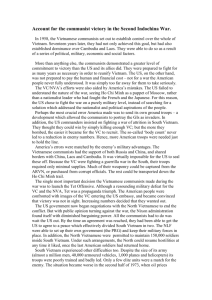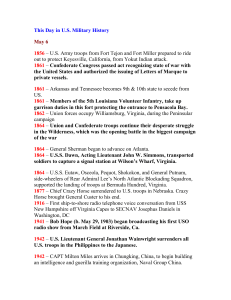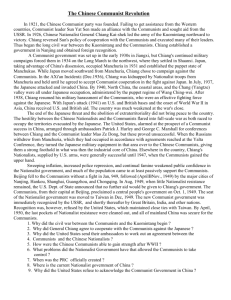This Day in US Military History
advertisement
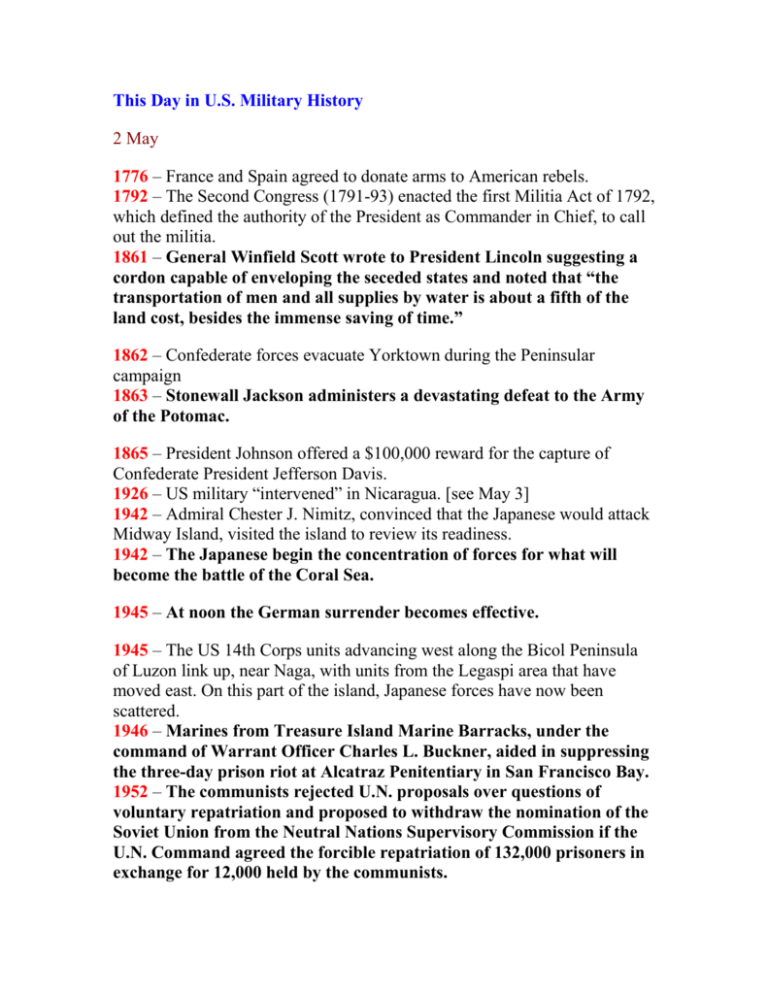
This Day in U.S. Military History 2 May 1776 – France and Spain agreed to donate arms to American rebels. 1792 – The Second Congress (1791-93) enacted the first Militia Act of 1792, which defined the authority of the President as Commander in Chief, to call out the militia. 1861 – General Winfield Scott wrote to President Lincoln suggesting a cordon capable of enveloping the seceded states and noted that “the transportation of men and all supplies by water is about a fifth of the land cost, besides the immense saving of time.” 1862 – Confederate forces evacuate Yorktown during the Peninsular campaign 1863 – Stonewall Jackson administers a devastating defeat to the Army of the Potomac. 1865 – President Johnson offered a $100,000 reward for the capture of Confederate President Jefferson Davis. 1926 – US military “intervened” in Nicaragua. [see May 3] 1942 – Admiral Chester J. Nimitz, convinced that the Japanese would attack Midway Island, visited the island to review its readiness. 1942 – The Japanese begin the concentration of forces for what will become the battle of the Coral Sea. 1945 – At noon the German surrender becomes effective. 1945 – The US 14th Corps units advancing west along the Bicol Peninsula of Luzon link up, near Naga, with units from the Legaspi area that have moved east. On this part of the island, Japanese forces have now been scattered. 1946 – Marines from Treasure Island Marine Barracks, under the command of Warrant Officer Charles L. Buckner, aided in suppressing the three-day prison riot at Alcatraz Penitentiary in San Francisco Bay. 1952 – The communists rejected U.N. proposals over questions of voluntary repatriation and proposed to withdraw the nomination of the Soviet Union from the Neutral Nations Supervisory Commission if the U.N. Command agreed the forcible repatriation of 132,000 prisoners in exchange for 12,000 held by the communists. 1964 – An explosion of a charge assumed to have been placed by Viet Cong terrorists sinks the USNS Card at its dock in Saigon. 1968 – The U.S. Army attacked Nhi Ha in South Vietnam and began a fourteen-day battle to wrestle it away from Vietnamese Communists. 1970 – American and South Vietnamese forces continue the attack into Cambodia that began on April 29. 1970 – Student anti-war protesters at Ohio’s Kent State University burned down the campus ROTC building. Ohio Governor James A. Rhodes ordered in the National Guard to take control of the campus. 1975 – US Navy departs Vietnamese waters at end of evacuation. 1992 – Los Angeles began to recover from rioting that had erupted in the wake of the Rodney King-taped beating acquittals; about 2,800 National Guard troops patrolled the city while 3,200 stood by. 1992 – Iraq admits to having had a “defensive” biological weapons program. 1996 – UNSCOM supervises the destruction of Al-Hakam, Iraq’s main biological weapons facility. 1999 – A US F-16 went down over western Serbia on the 39th night of air strikes. Allied forces rescued the pilot. 1999 – Yugoslav authorities handed over to the Rev. Jesse Jackson three American prisoners of war who had been held for 32 days. 1999 – NATO bombings struck the Obrenovac power plant in Belgrade and blacked out large areas of Serbia.





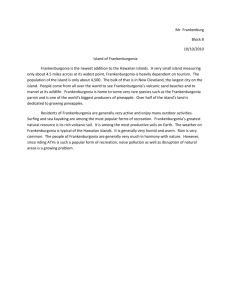


![vietnam[1].](http://s2.studylib.net/store/data/005329784_1-42b2e9fc4f7c73463c31fd4de82c4fa3-300x300.png)
